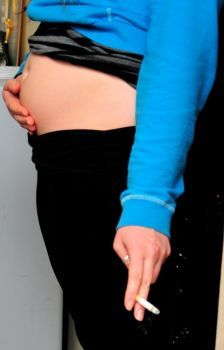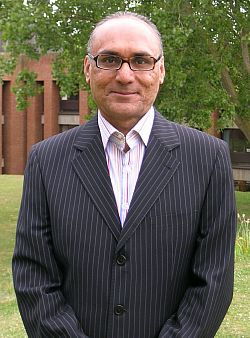New strategies needed to prevent smoking relapse in new mothers
Nearly half of mothers who quit smoking during pregnancy relapse during the first six weeks after giving birth, but new strategies need to be developed to reduce this, according to research from the Brighton and Sussex Medical School (BSMS).
 Will this pregnant woman give up smoking? And if she does, what might help her not to relapse? New research from BSMS says new strategies need to be developed.
Will this pregnant woman give up smoking? And if she does, what might help her not to relapse? New research from BSMS says new strategies need to be developed.
 Dr Anjum Memon, Senior Lecturer at Brighton and Sussex Medical School and Consultant in Public Health Medicine.
Dr Anjum Memon, Senior Lecturer at Brighton and Sussex Medical School and Consultant in Public Health Medicine.
In a new research paper, published in Nicotine and Tobacco Research, the two co-authors add that mothers living with another smoker were six times more likely to start smoking again.
The epidemiological study of 512 mothers, probably one of the largest on the subject, was based on an analysis of the Child Health Surveillance System (CHS) in the UK. It was carried out by Dr Anjum Memon, Senior Lecturer and Consultant in Public Health Medicine at BSMS, and Clare Harmer, from Public Health in NHS East Sussex.
Women who relapsed within a few weeks of delivery were more likely to be living in deprived urban areas, have two or more children, living with other smokers in the household, and not breast feeding their baby.
Implications for the mothers’ health include increased risk of cancer, heart and lung diseases, adverse pregnancy outcomes, and fertility problems. Children exposed to second-hand smoke are at an increased risk of sudden infant death syndrome (SIDS), respiratory and middle-ear infection, asthma, reduced lung function and meningitis.
Around 23,000 pregnant women in England have used the NHS Stop Smoking Service in 2012. By widening its counselling and support services not just to prospective new mothers, but also to the smokers who live with them, this research suggests that relapse rates could be reduced, improving health for the whole family, while making the £85m service more effective to the taxpayer.
Dr Memon said: “Preventing smoking relapse is an important public health issue, because of the serious health consequences for mother and child.
“This research shows that women who are most vulnerable to relapse can be identified in the antenatal period as requiring extra support/counselling after the delivery to maintain a smoke-free status.
“These interventions may be more effective if they include strategies aimed at assisting other household members to give up smoking as well.”
Clare Harmer added: “Breast feeding is a strong incentive not to relapse into smoking, but several factors such as the mother’s age, ethnicity, number of children, level of education, socioeconomic and marital status, smoking status (before and after delivery), are associated with the nature and duration of breast feeding.
“Therefore, more research is needed to determine the direction of association between breast feeding and smoking relapse.”
